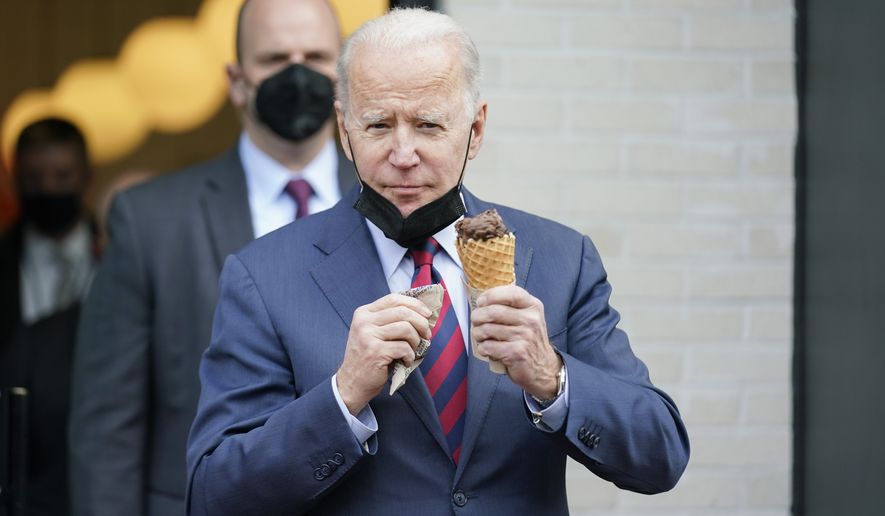OPINION:
It’s time to take stock just over one year into the Biden administration of how well U.S. foreign policy is dealing with the array of wickedly complex threats to our national security. Paraphrasing then-candidate Ronald Reagan’s famous question during his October 1980 debate with former President Jimmy Carter, “Are we safer today than we were a year ago?”
Terrorism is still the national security threat with the shortest fuse. Since 9/11, the U.S. has successfully removed terrorist leaders and their foot soldiers from the battlefield. But successive U.S. administrations have struggled to deny terrorists ungoverned space where they plot against us and eliminate the root causes of terrorism.
The Biden administration’s chaotic withdrawal from Afghanistan left behind a failed state and a petri dish for breeding new terror threats. The U.S. lost its closest ally in the region, the former government of Afghanistan, whose soldiers bravely fought and died, partnering with the U.S. and NATO on counterterrorism.
The Taliban, whose deputy leader Sirajuddin Haqqani is a U.S.-designated global terrorist, now owns the battle space where ISIS and al Qaeda enjoy the safe haven that launched the 9/11 attacks. Their victory represents a clear and present danger to our homeland.
There is absolutely no evidence that the Biden administration’s sweet-sounding but opaque “over-the-horizon” strategy to prevent threats will protect us. Afghanistan now represents a greater threat to our nation than ever before.
Iran has enriched enough weapons-grade uranium for a single nuclear weapon in as little as three weeks, rather than the 12 months as the 2015 nuclear deal stipulated. Iran reportedly can detonate a nuclear explosive underground test in as little as six months. Iran has brazenly violated the agreement in the wake of the U.S. withdrawal, including accumulating key knowledge on advanced centrifuges. Iran’s ballistic missile program and terror proxies in the region, neither of which the 2015 deal addressed, continue in full force.
There is no sign that the Biden administration’s strategy of negotiating a “longer and stronger” deal with Iran’s rogue state will bear fruit. Iran provides massive material support to its terrorist allies Hezbollah in Lebanon and the Houthis in Yemen, Syrian dictator Bashar Assad, and Shiite militias in Iraq, which are even now launching attacks on U.S. personnel. Having secured a strategic partnership with China on top of its existing one with Russia, Iran is arguably more dangerous to the region and beyond than ever before.
Decrying the U.S. preference for a “stable and predictable” relationship, Russia is directly threatening what is left of Ukraine’s territorial integrity by deploying over 100,000 troops on Ukraine’s border. President Vladimir Putin knows that NATO membership, which requires unanimous consent, is not a near-term option for Ukraine, given French and German opposition. But he is dialing up the pressure to control what he views as Russia’s historical sphere of influence and make NATO appear weak.
Ukraine is an existential threat to Russia only because of its effort to build a democracy. The last thing Mr. Putin wants on Russia’s border is a functioning democracy, one that would be a shining beacon of hope to his own exploited and repressed population.
Having induced the U.S., the OSCE and NATO to engage in negotiations on Russia’s terms, Mr. Putin is dictating the pace of the Ukraine crisis. Russia made the most unrealistic demands with a full-throttled propaganda onslaught, twisting NATO’s status as a defensive alliance into some aggressive menace. Mr. Putin is poised to argue Russia made “reasonable” demands, which were rebuffed and left him no choice but to manage the crisis he created with as much force as he deems necessary.
Meanwhile, North Korea fired two suspected ballistic missiles into the sea last week and another two this week, for a total of six such weapons launched this month. With his economy in a COVID-19 induced free fall and clearly dissatisfied with the pause in diplomacy, which he uses to extort the U.S. and its allies for sanctions relief, Kim Jong-un wants a piece of the Biden administration’s attention.
And let’s not forget about China, which concealed the outbreak and severity of the COVID-19 pandemic now responsible for over 5 million deaths worldwide. China is brazenly threatening Taiwan’s independence, stealing our intellectual property, destroying the environment by emitting more greenhouse gas than any other nation, and menacingly expanding its nuclear arsenal and military might, including with hypersonic missiles.
The Biden administration’s scorecard on foreign policy might be headed for a subpar grade, but at this point, let’s give it a generous “incomplete” — with one admonition: We have precious little time to harden our defenses and protect both ourselves and our allies from ruthless global adversaries on the march.
• Daniel N. Hoffman is a retired clandestine services officer and former chief of station with the Central Intelligence Agency. His combined 30 years of government service included high-level overseas and domestic positions at the CIA. He has been a Fox News contributor since May 2018. Follow him on Twitter @DanielHoffmanDC.




Please read our comment policy before commenting.